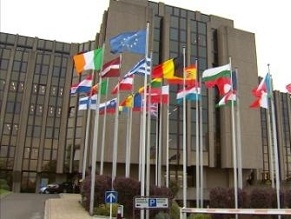|
World Jewish News

The European Court of Auditors in Luxembourg describes itself as the ''Guardians of EU finances.''
|
EU denies its financial aid to the PA is going to former prisoners released by Israel
12.12.2013, Israel and the World The European Court of Auditors, the Luxembourg-based body which describes itself as the ‘’Guardians of EU finances, ’’ denied reports that EU money earmarked to the Palestinian Authority is going to pay salaries of Palestinian prisoneres released by Israel in the framework of the launch of Israeli-Palestininian peace talks.
‘’No EU money goes to anybody suspected of terrorism,’’ said EU Auditor Hans Gustaf Wessberg in response to reports that the Palestinin Authority (PA) is rewarding released Palestinian prisoners, who were convicted for killing Israeli civilians, and is paying them monthly salaries meant normally to PA civil servants.
Wessberg who made public Tuesday in Brussels the ECA’s report on the use of PEGASE DFS, the EU’s direct financial support to the Palestinian Authority that amounted 1 billion euros between 2008 and 2012
‘’A list of beneficiaries is checked against a software called worldcheck that guarantees that no terrorist or people that are on a so-called ‘blacklist’ can be beneficiaries of the EU financial support,’’ Fabrice Mercade, head of ECA’s private office, told EJP.
‘’It’s technically impossible that PEGASE DFS reaches people involved in terrorist activities,’’ he said.
The Court of Auditors’report questions the sustainability of the EU direct financial support to the PA and calls for an ‘’overhaul’’ of the aid.
‘’While the Commission and European External Action Service (EEAS) have succeeded in implementing the support to the Palestinian Authority in difficult circumstances, there a number of aspects of the current approach that are increasingly in need of an overhaul,’’ Wessberg said.
While EU tax payers through the PEGASE programme pay about a fifth of the salaries of the 170,000 civil servants employed by the Palestinian Authority, Weissberg said that ‘’a considerable number of civil servants in Gaza are being paid without going to work and providing a public service.’’
Spot checks of 10 civil servants in Gaza found four weren't working at all. At one place, Wessberg said, out of 125 employees, 90 weren't working.
In their report, the auditors recommend the EU Commissioon and the EEAS to stop EU funding of civil servants in Gaza and to redirect the funds instead to the West Bank.
"Our suggestion is to discontinue the program for employees in Gaza," said Wessberg, adding that ‘’the payment of civil servants who do not work does not meet one of (the EU's) main objectives to provide public services to the Palestinian people."
Wessberg blamed the problem on the split in the Palestinian Authority between Hamas in Gaza and Palestinian Authority President Mahmoud Abbas's Fatah party in the West Bank.
The Gaza Strip has been governed by Hamas since the Islamist group took over violently the territory from Fatah in 2006. Many Gaza civil servants had not worked since the Islamist movement Hamas came to power in 2007, the auditors added.
EU auditors also said they had identified weaknesses in the European Commission's methods for allocating EU funds and they could not establish what had happened to 90 million euros that was meant to pay fuel taxes and keep Gaza's only power plant running. Fuel shortages mean it has now ceased to serve nearly half the 1.8 million population.
The European Commission says it is important to continue providing political support for the PA, and that includes paying salaries. But it also admits that it is hard to gauge hich civil servants are still working.
The EU, which is the biggest donor to the Palestinians, has provided more than 5.6 billion euros in assistance since 1994 to support its objective of helping to bring about a two-state solution to end the Israeli-Palestinian conflict.
by: Yossi Lempkowicz
EJP
|
|
